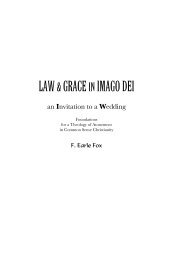Download entire 232-page book HERE (PDF ... - MassResistance
Download entire 232-page book HERE (PDF ... - MassResistance
Download entire 232-page book HERE (PDF ... - MassResistance
You also want an ePaper? Increase the reach of your titles
YUMPU automatically turns print PDFs into web optimized ePapers that Google loves.
If I respect you as a person with a value equal to mine, I will behave accordingly. I will treat you with<br />
courtesy, listen when you have something to say, grant you the same basic rights that I have, respect<br />
your personal property, and be aware of your individual, personal qualities and claims. What<br />
happens if we have a disagreement, or if our desires or claims clash? In an equality-and-respect-based<br />
system, we will continue to treat each other with courtesy, listen to each other’s side, guard each<br />
other’s basic rights, and respect each other’s personal claims and property. We will try to find a<br />
solution or submit our cases to an outside authority, or we might simply agree to disagree. Neither<br />
of us will attempt to use force, intimidation, name-calling or lies (or any other kind of manipulation)<br />
to get our own way.<br />
This system of respect-based behavior is called “civility.” When there is an atmosphere of civility,<br />
each one of us is assured of being heard, treated and judged as a respected individual. Each will feel<br />
free to express and defend his/her own point of view. Each one can rely on a safe, fair and workable<br />
means of handling conflicts. And each will have an investment in the civility “code,” a reason to hang<br />
on to it, because it guarantees the best quality of life for everyone.<br />
This truth helps us to see how our values (ideas about what is good or bad) form a base on which a<br />
system of mutual respect and civility can rest. If a space alien were to come to earth and look at the<br />
system we have described, he would easily see from our civility code that we place a high value on<br />
such things as freedom of speech, living safely among our neighbors, personal control of our own<br />
lives, and so on.<br />
On the opposite side, he would learn that we do not like such things as losing control of our lives to<br />
someone else, being told what to believe or say, or having people resort to force, manipulation or<br />
disrespect when they have conflicts. The alien might draw a diagram in his notes about us which<br />
looked something like this:<br />
Our<br />
VALUES,<br />
form<br />
HOW WE PUT THE CIVIL IN CIVILIZATION<br />
the<br />
CIVILITY CODE<br />
which guide our<br />
BEHAVIOR<br />
creating our<br />
QUALITY<br />
OF<br />
LIFE<br />
Examples: Personal responsibility,<br />
freedom of<br />
expression, social harmony,<br />
etc.<br />
The rules that tell us how<br />
to treat others and what<br />
to expect from them<br />
Our day-to-day actions<br />
based on our choices.<br />
The fruit of civility.<br />
The alien might also report, in his “Conclusions” section, that most of us rate our quality of<br />
life as “good” if it lines up with our important values, that is, if we feel free, safe and able to<br />
live at peace with our neighbors. And he would no doubt reason that we would want to hold<br />
on to this good quality of life by publicly declaring our values, preserving our civility code,<br />
following it in our daily lives, and passing it on to our children and grandchildren.<br />
Redeeming the Rainbow 193






